Adhd Dopamine Relationships
Coincidentally, the intricate dance between ADHD and dopamine levels uncovers a fascinating interplay worth exploring. As we navigate through the complexities of ADHD symptoms, it becomes evident that dopamine, a pivotal neurotransmitter, holds the key to revealing a deeper understanding.
With dopamine's influence on attention, motivation, and behavior, the implications for ADHD management are profound. Stay tuned to unravel the significance of dopamine in shaping ADHD outcomes and the promising avenues it opens for improving therapeutic strategies.
Key Takeaways
- Dopamine dysregulation impacts ADHD symptoms.
- Treatment strategies target dopamine for symptom management.
- Dopamine transporter density is lower in ADHD.
- Understanding dopamine dynamics is crucial for effective ADHD interventions.
Understanding ADHD and Dopamine
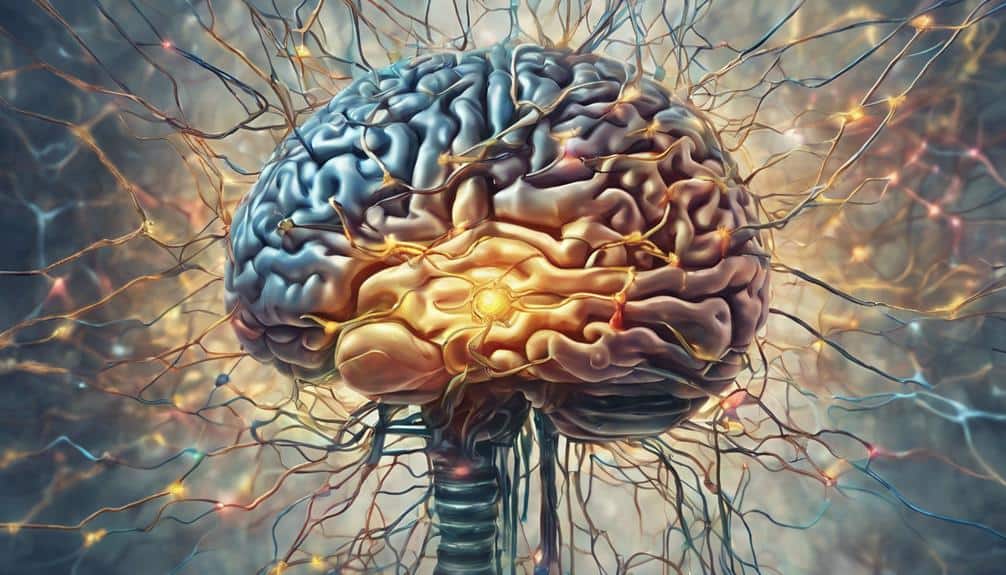
In understanding ADHD and its relationship with dopamine, it becomes apparent that dopamine plays an essential role in regulating various cognitive and emotional functions within the brain. In individuals with ADHD, there can be disruptions in the dopamine reward system, leading to symptoms such as fatigue, lack of motivation, mood swings, and cravings for dopamine-inducing substances.
Research indicates that inadequate natural dopamine production and utilization are associated with ADHD symptoms, impacting emotional well-being and motivation. The complex relationship between ADHD symptoms and dopamine levels is influenced by factors like dopamine transporters, which can affect the expression of ADHD traits.
Managing ADHD often involves a multifaceted approach, combining medication and therapy to address dopamine-related issues and improve symptoms like inattention and impulsivity. By targeting dopamine dysregulation, treatment strategies aim to enhance cognitive functions and emotional regulation in individuals with ADHD.
Understanding the intricate interplay between ADHD and dopamine is vital for developing effective management strategies tailored to address the specific needs of individuals with this disorder.
Dopamine: The Key Neurotransmitter
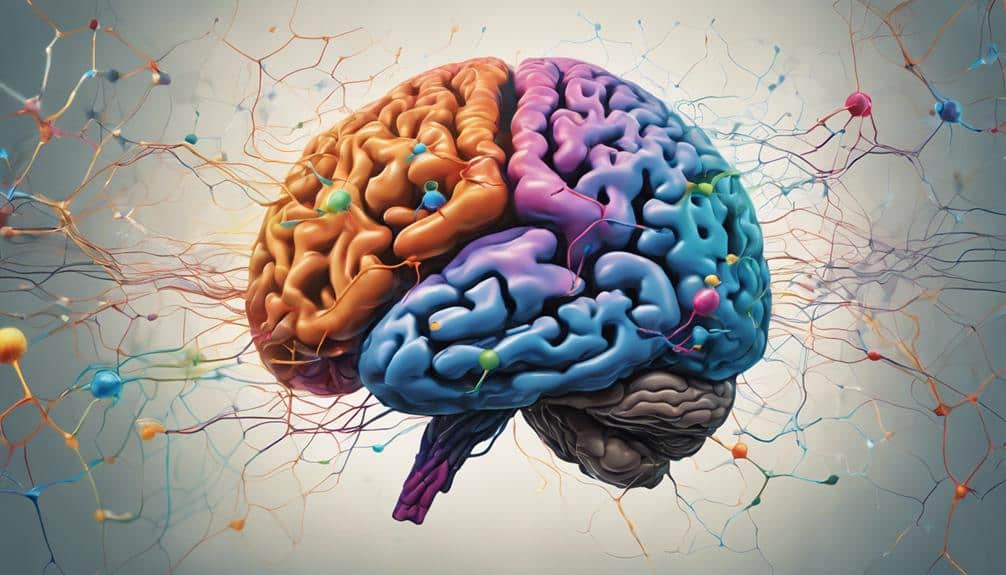
Moving from the discussion on ADHD and dopamine, the focus now shifts to the pivotal role of dopamine as a key neurotransmitter in cognitive and emotional functions within the brain.
Dopamine, a neurotransmitter essential for learning, motivation, and emotional responses, plays a critical role in regulating feelings of reward, satisfaction, and pleasure. Dysfunctional dopamine transmission is closely linked to ADHD symptoms such as inattention and hyperactivity. Inadequate dopamine reception in the brain is a contributing factor to the manifestation of ADHD traits and challenges. Researchers have established a correlation between ADHD and issues in dopamine production and utilization in the brain.
Understanding the intricate relationship between dopamine and ADHD is critical in comprehending the underlying mechanisms of this disorder. The delicate balance of dopamine in the brain is crucial for proper cognitive and emotional functioning, and disruptions in this balance can lead to the characteristic symptoms observed in individuals with ADHD.
Dopamine Imbalances in ADHD
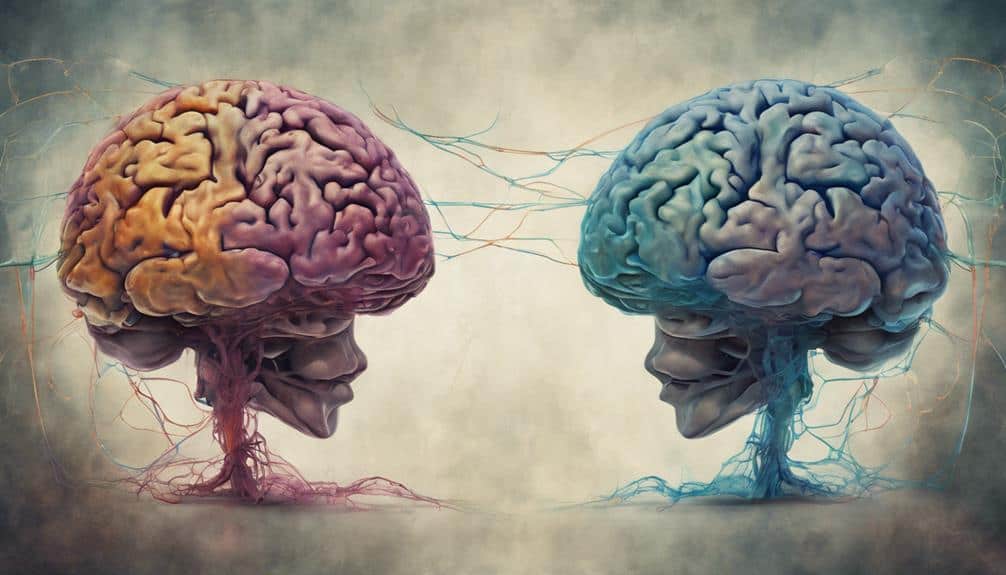
Dopamine imbalances in ADHD can greatly impact attention levels and contribute to various symptoms.
Understanding the role of dopamine in ADHD is important for exploring effective treatment options.
Research suggests that addressing dopamine dysregulation may offer promising pathways for managing ADHD symptoms.
Dopamine Role in ADHD
Often overlooked in discussions about ADHD, the intricate role of dopamine imbalances in the manifestation of symptoms is essential for understanding the disorder's underlying mechanisms. Dysfunctional dopamine transmission in the ADHD brain is closely tied to symptoms like inattention and hyperactivity.
Insufficient dopamine reception can impact motivation and emotional responses, contributing to traits associated with ADHD. Research indicates that ADHD is linked to challenges in dopamine production and utilization. Individuals with ADHD may exhibit fatigue, mood swings, and cravings for dopamine-boosting sources such as carbohydrates and sugar.
The relationship between ADHD symptoms and dopamine levels is intricate, with dopamine playing an essential role in motivation, reward processing, and emotional well-being. Understanding these dynamics is critical for developing effective interventions for individuals with ADHD.
Impact on Attention
Attention deficits in individuals with ADHD are heavily influenced by disrupted dopamine levels, impacting their ability to sustain focus and cognitive engagement.
Dopamine, a neurotransmitter, plays an important role in regulating attention and motivation, which are essential for maintaining focus. In ADHD, imbalances in dopamine transmission can lead to difficulties in concentrating and staying attentive.
Low levels of dopamine in the brain contribute to inattentiveness and distractibility, affecting cognitive functioning. The disruption of the brain's reward system due to dopamine irregularities further complicates attention regulation in individuals with ADHD.
Understanding the relationship between dopamine and attention is important for developing targeted interventions to improve focus and cognitive abilities in those with ADHD. Addressing dopamine imbalances may offer new insights into managing attention-related symptoms effectively.
Treatment Options Available
In exploring the management of dopamine imbalances in ADHD, it's essential to contemplate the array of treatment options available for addressing these neurochemical challenges. Stimulant medication stands out as a common and effective approach for addressing dopamine imbalances in individuals with ADHD.
Behavioral therapy, particularly beneficial for young children with ADHD and dopamine-related issues, plays a pivotal role in thorough treatment plans. Different formulations of stimulant medication offer flexibility in tailoring treatment to individual needs related to dopamine imbalances.
Individualized treatment plans are paramount in effectively managing ADHD symptoms associated with dopamine irregularities. Regular monitoring and adjustments to treatment plans are necessary to address the dynamic nature of dopamine-related challenges in ADHD.
Careful consideration and a multidimensional approach are key in navigating the diverse treatment options for dopamine imbalances in ADHD.
Impact of Dopamine on ADHD Symptoms
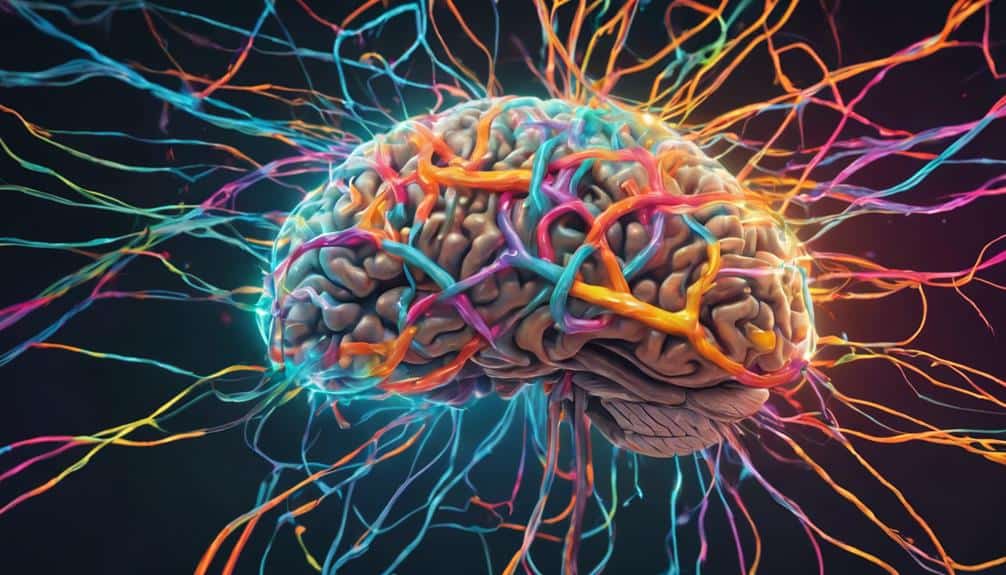
Dysfunctional dopamine transmission in individuals with ADHD intricately influences the manifestation of symptoms such as inattention, hyperactivity, and impulsivity. This neurotransmitter plays a vital role in regulating various cognitive functions and behaviors in the brain.
Here are some key points to contemplate:
- Insufficient dopamine reception in the brain can lead to fatigue, mood swings, and cravings for dopamine sources.
- The relationship between ADHD symptoms and dopamine levels is complex, impacting motivation, mood, and cognitive function.
- Individuals with ADHD may engage in dopamine-enhancing behaviors like excessive consumption of carbohydrates and sugars.
- Research indicates that dopamine levels and transporters are involved in influencing ADHD symptoms and behaviors.
- Understanding how dopamine dysregulation affects ADHD symptoms could provide insights into developing more targeted treatments for individuals with this condition.
Treatment Strategies for Dopamine and ADHD
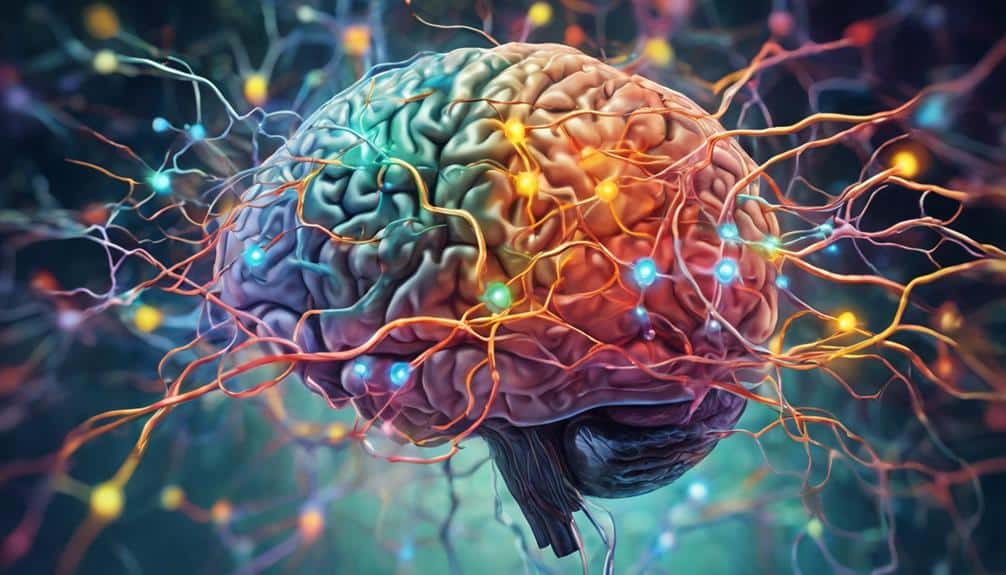
When addressing dopamine-related treatment strategies for ADHD, it's crucial to contemplate the use of stimulant medications to regulate dopamine levels in the brain.
Behavioral therapy can also play a significant role in managing ADHD symptoms by targeting behavioral patterns linked to dopamine dysregulation.
Lifestyle modifications, in conjunction with medication and therapy, are recommended to optimize dopamine function and enhance symptom management in individuals with ADHD.
Medication for ADHD
Optimizing dopamine levels through targeted medication is a fundamental strategy in effectively managing ADHD symptoms. When considering medication for ADHD, there are a few important points to keep in mind:
- Stimulant medication, like methylphenidate and amphetamine salts, is commonly used to increase dopamine levels and improve focus and attention.
- Different formulations of stimulant medication target dopamine receptors to enhance cognitive function in individuals with ADHD.
- Non-stimulant medications such as atomoxetine also impact dopamine levels to alleviate symptoms of ADHD.
The primary goal of ADHD medication is to regulate dopamine transmission, leading to enhanced cognitive function and reduced impulsivity.
Effective medication management plays a crucial role in helping individuals with ADHD achieve better dopamine regulation and symptom control.
Behavioral Therapy Options
Utilizing behavioral therapy is a pivotal approach in addressing dopamine-related challenges in individuals with ADHD. Behavioral therapy plays a critical role in treating ADHD by focusing on changing behaviors and developing coping strategies. It aims to enhance time management, organizational skills, and emotional regulation in individuals with ADHD.
Techniques such as cognitive-behavioral therapy (CBT) and behavior modification are commonly employed in behavioral therapy for ADHD. By providing practical tools and strategies, behavioral therapy helps individuals with ADHD manage impulsivity, inattention, and hyperactivity more effectively.
This form of therapy equips individuals with ADHD with the skills needed to function better in their daily lives, promoting a more structured and controlled approach to managing their symptoms.
Lifestyle Modifications Recommended
To optimize dopamine levels in individuals with ADHD, incorporating lifestyle modifications is essential for effective treatment strategies. By focusing on specific aspects such as exercise, sleep, dopamine regulation, stimulants, mindfulness practices, and structured routines, individuals with ADHD can better manage their symptoms and improve their overall well-being.
Here are five key lifestyle modifications recommended for individuals with ADHD:
- Regular exercise to regulate dopamine levels.
- Ensuring adequate sleep for better dopamine regulation.
- Avoiding excessive stimulant intake like caffeine and sugar.
- Engaging in mindfulness practices for emotional well-being.
- Establishing a structured routine and setting achievable goals for improved dopamine production and management.
Dopamine Transporter Density in ADHD
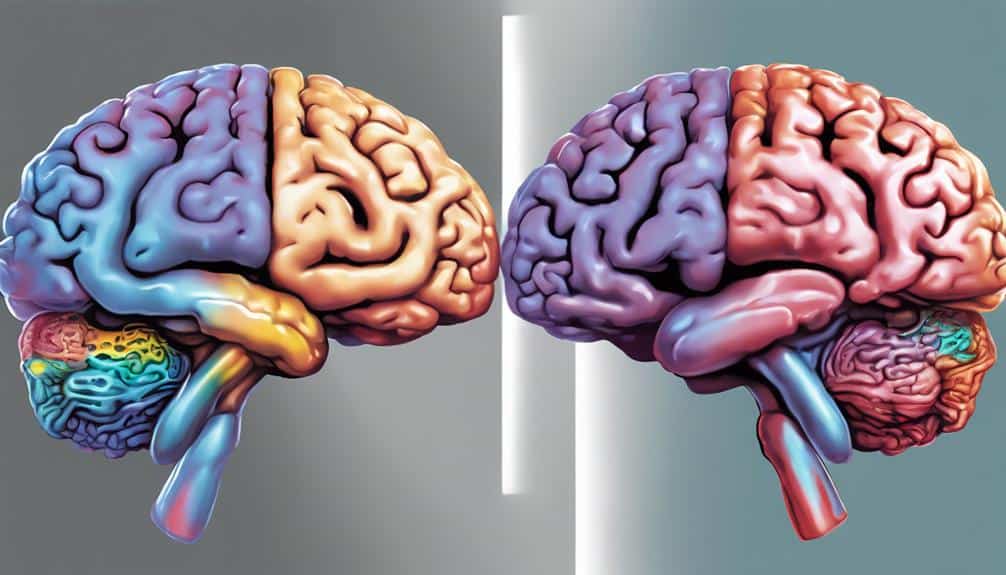
Lower dopamine transporter density in specific brain regions is a notable characteristic observed in individuals with ADHD compared to those without the disorder. This difference influences dopamine reuptake, which plays a vital role in neurotransmission and brain signaling.
The altered dopamine transporter density seen in ADHD may contribute to irregular dopamine levels and functioning, potentially giving rise to symptoms such as inattention and impulsivity. Studies utilizing imaging techniques have identified variations in dopamine transporter density specifically in regions like the striatum and prefrontal cortex in individuals with ADHD.
These findings underscore the importance of comprehending dopamine transporter density variances in ADHD to gain a better understanding of the neurobiological underpinnings of the disorder. By examining these alterations in dopamine transporter density, researchers can potentially uncover new insights into the mechanisms driving ADHD symptoms and pave the way for more targeted treatment approaches in the future.
The Future of ADHD Treatment
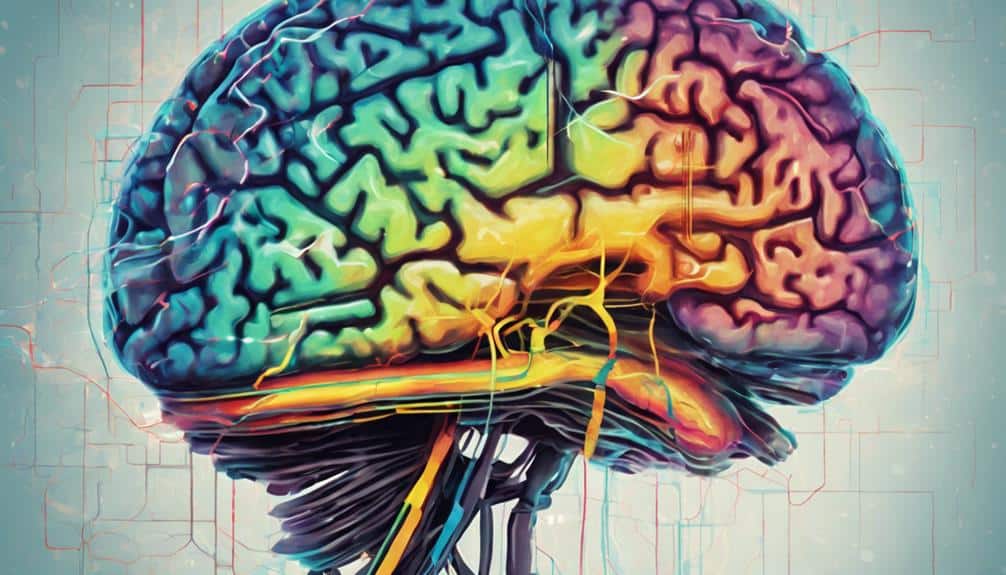
In considering the future of ADHD treatment, personalized medicine tailored to individual dopamine levels and neurotransmitter functioning may play a crucial role.
Advancements in neuroimaging techniques could help identify specific brain regions and pathways related to dopamine dysregulation in ADHD.
Targeted therapies aiming to modulate dopamine receptors or transporters could offer more precise and effective treatment options for ADHD.
Research on gene-environment interactions related to dopamine functioning may lead to innovative approaches in managing ADHD symptoms.
Emerging technologies like brain stimulation or digital therapeutics targeting dopamine pathways show promise for enhancing ADHD treatment outcomes.
Frequently Asked Questions
Why Do People With ADHD Struggle in Relationships?
I struggle in relationships due to communication challenges, emotional regulation issues, trust problems, hyperfocus imbalances, rejection sensitivity, and impulsivity consequences. These factors can lead to misunderstandings, conflicts, and feelings of neglect or frustration.
Does ADHD Chase Dopamine Relationships?
I do not chase dopamine in relationships. Dopamine regulation affects my behavior. Impulsivity challenges arise due to neurotransmitter impact. Emotional dysregulation impacts relationship satisfaction. Attention difficulties may affect how I navigate relationships. Understanding these components helps me manage relationship dynamics effectively.
What Is the Honeymoon Phase of Adhd?
What sparks the initial excitement in a relationship, leading to an intense connection and short-lived passion? The honeymoon phase, characterized by emotional intensity and idealization, creates a sense of euphoria before potential challenges arise.
Is ADHD a Red Flag in a Relationship?
Yes, ADHD can be a red flag in a relationship. Communication struggles, emotional intensity, trust issues, impulsivity challenges, hyperfocus tendencies, and the need for robust support systems can strain relationships. Seeking intervention and effective communication strategies is vital.
Conclusion
To sum up, the intricate dance between ADHD and dopamine levels is like a symphony – when the notes are in harmony, the mind functions smoothly, but when out of tune, chaos ensues.
By understanding and addressing dopamine imbalances, individuals with ADHD can find relief and better manage their symptoms.
Just as a conductor guides the orchestra to create beautiful music, optimizing dopamine levels can lead to a more harmonious and balanced life for those with ADHD.







